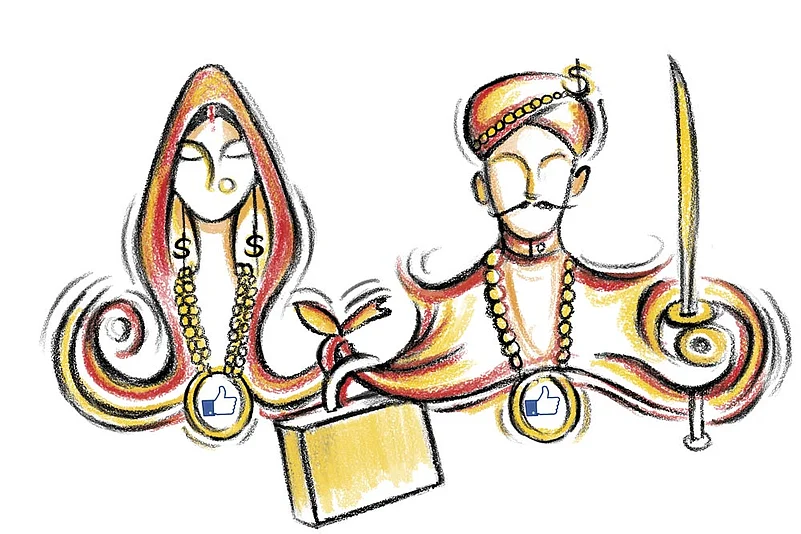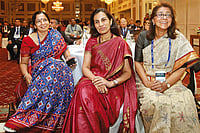Cleopatra inherited the kingdom of Egypt on her father’s death, was removed from power but seduced Julius Caesar and linked herself with Rome. Caesar, hopelessly in love, returned Cleopatra her throne, expanding his empire along with hers. This was 48 BC, and one of the earliest recorded—or at least most famous—instances of empire-building through judicious marriage.
The practice is uniquely extant in India’s business families, where it works pretty much like mergers and acquisitions. Two business families meet and negotiate, the son acquires a wife or vice versa, and overnight, the combined business holding is bigger than the sum of its parts. For some, it’s a diversification, for others consolidation. Like the recent wedding of the son of a steel tycoon with the daughter of one of the owners of M3M India, the real estate group based in Gurgaon. A steel manufacturer’s family and a construction business baron made for a wedding made in business heaven, even if the celebrations were held in Turkey.
It’s actually a no-brainer. Successful businessmen like their children to marry children of other successful businessmen. In India, arranged marriages are the rule, not the exception; so the couple getting married is actually part of the larger scheme of things. Usually, they go along, knowing their horoscopes match, it has the astrologer’s assent, they have the same upbringing and values. Having grown up in a joint family, the transition to a new family is pretty seamless. For the girl, it just means moving from one mansion to another and a new set of relatives to get used to living with, content in the knowledge that the parents are reaping the benefits. Money trumps most things. As one upscale marriage broker puts it: “The only caste that matters is the billionaire caste.”
It happens so frequently these days that one forgets how fast and furiously the business family tree has expanded. Take Dhirubhai Ambani’s daughters. Dipti was married to Dattaraj Salgaocar, scion of Goa’s biggest mining empire. The second daughter Nina married ‘Shyam’ Kothari, from one of south India’s biggest business conglomerates. The industrialist passed away in Houston earlier this year. Their daughter, Nayantara, married Shamit, son of Shobhana Bhartia, chairperson of Hindustan Times, and Shyam Bhartia, chairman and MD of the Jubilant Group. Shobhana is the daughter of industrialist K.K. Birla. Then there is Dhirubhai’s niece Vita, who married Jalaj Dani, son of Asian Paints promoter Ashwin Dani. Her brothers Hital Meswani and Nikhil Meswani sit on the RIL board.
In fact, matrimonial listings of India’s billionaires reads like the Who’s Who of Indian business. Gautam Adani’s son Karan married Paridhi Shroff, daughter of Cyril Shroff, arguably the biggest name in India’s corporate law. Agnivesh, son of Vedanta group’s Anil Agarwal, cemented his marriage to Puja, daughter of Hari Mohan Bangur of Sree Cement. Venu Srinivasan of the tvs group got hitched to Mallika from the family that owns the Amalgamations Group, while his daughter Lakshmi married Infosys founder Narayana Murthy’s son Rohan. Videocon’s Venugopal Dhoot’s son Aniruddh married Pooja, daughter of Arvind Poddar of Siyaram Silk Mills. Then there’s Khushagra, son of Shishir Bajaj, who is married to Kumar Mangalam Birla’s sister Vasavadatta. rpg Enterprises’ chairman Harsh Goenka’s daughter Vasundhara is married to Apoorva of the Patni family while Delhi’s hottest power couple is Naveen Jindal, chairman of Jindal Power & Steel, and Shalu, daughter of Oswal Green Tech’s Abhey Oswal.
The list goes on, but it basically echoes that oft-crooned Tina Turner song: “What’s love got to do with it?” For those used to operating in the financial stratosphere, alliances through weddings are just business as usual.

Illustration by Saahil
In fact, just like any other linguistic, religious or caste grouping, business communities are comfortable within their own circles. People know each other, they also know the skeletons in respective cupboards, which are conveniently ignored when it comes to a mutually beneficial alliance. One skeleton that tumbled out into the public domain was the IPL betting scandal involving Gurunath Meiyappan, son-in-law of N. Srinivasan of India Cements, the BCCI boss at the time. The Meiyappan family ran AVM, a leading production house for Tamil films.
What the offspring of India’s business families also often tend to have in common is a degree from the world’s top universities, now a required rite of passage. So we now have a website called Blues Match, which brings together alumni of Oxbridge and Ivy League universities in America. And, in keeping with the digital age, there’s even a smartphone app called Luxy, meant for those who want to get together with their financial equals. Its tagline is: ‘Tinder without the poor people’. It may be overtly snobbish but it is, in effect, a digital matchmaking service for the rich looking to marry into their own kind. In India, there’s vipshaadi.com, which promises to “find you the most fitting match as per your stature”. There’s also Shubhlaagan.com which has a section for High Net-worth Individuals (HNIS) and a special team dedicated to the Marwari community. Usually, however, these are people who mingle and move in the same circles, so the matchmakers are the parents and, not surprisingly, most alliances are fixed at high-profile venues which could be in Vancouver, Versailles or Venice.
Like with any marriage, or business, there are risks involved. When the people involved are hnis with a famous business pedigree, it makes them susceptible to sensational newspaper headlines, as was the case with Indrani and Peter Mukerjea. Dilip Piramal, owner of branded luggage-maker VIP, was one. In 2005, he divorced his wife of 20 years Gita. Six days after their daughter Aparna got married, Dilip also married a woman he was having a relationship with.
The most sensational, and the most public, involved the Mafatlals, one of India’s oldest business families. It ended with global jet-setter Sheetal Mafatlal spending a night on a cot in prison, instead of on her usual Versace bed-sheets. She personified the lifestyle of the rich and famous, draped in designer gowns and diamonds, as she strutted from one Page 3 event to another. Time magazine in its September 2006 issue described Sheetal as someone who “could easily afford to scoop up gowns by the gross”. She was instead scooped up by the customs people after she allegedly walked through Mumbai airport’s green channel without declaring or paying duty for jewellery worth lakhs. She was clearly an unconventional type: she married Atulya Mafatlal, who had two children from his first marriage and who had been engaged to her sister. She declared war on the Mafatlals once she was ensconced in the 10,000-square-foot Mafatlal bungalow in Mumbai’s upscale Altamount Road. The matter went to court over issues such as missing paintings and jewellery worth crores. More scandal was to follow when Aparna, Atulya’s eldest sister, underwent a sex change operation and became Ajay.
Generally, however, business families forge alliances that are durable and complement their mutual business interests. What has changed are the size and scale of the weddings. It may be tough to beat Lakshmi Mittal’s extravagance in Paris and Versailles for the wedding of his daughter, but it’s increasingly becoming a contest to spend the most. An Rs 100-crore wedding has become almost like its Bollywood box office counterpart, a benchmark that defines your financial worth. ‘Mine is bigger than yours’ has acquired a new context among India’s rich. It’s the era of the Big Fat Indian Wedding and if there are two business families involved, it gets bigger and fatter. Last February, the Hinduja wedding in Udaipur saw performances by Ranveer Singh, Arjun Kapoor, Nicole Scherzinger and Jennifer Lopez. It reportedly cost £15 million. The marriage of business has become the business of marriage.
Dilip Bobb, Executive Editor


























